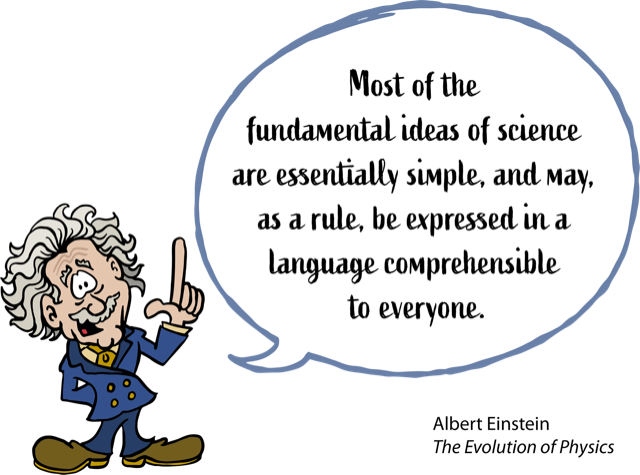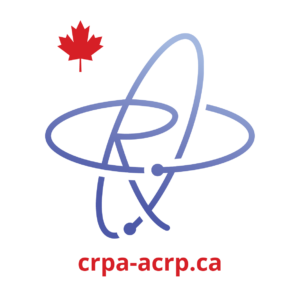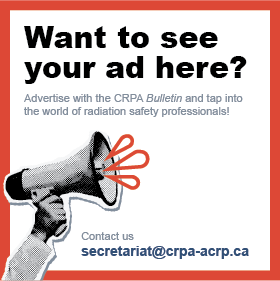Let’s Be Clear—Practical Advice to Help Scientists Write with Confidence

I’m not a scientist, but if you’re reading this, chances are pretty good that you are.
There’s also a pretty good likelihood that you’re not crazy about writing or, at the very least, you’re not very confident about your writing abilities. You’re a scientist, after all, not a writer!
And yet, clear and effective writing is an increasingly important skill in a science career. Like it or not, you have to write all the time—proposals, reports, training material, presentations, even mundane email correspondence . . .
Unfortunately, the education and training of scientists are often so overwhelmingly committed to the technical aspects of science that the communication arts are neglected or ignored. In short, many good scientists are poor writers. Certainly, many scientists do not like to write.
~ Robert A. Day
How to Write and Publish a Scientific Paper
In his recent Bulletin article, “Fear—Why Radiation Safety Professionals Need to Address Public Fear with Understanding,” Stéphane Jean-François reminded us that “sound expertise and clear communication of facts are a good start to mitigate fear,” but “a simple misinterpretation of a fact by Joe or Jane Public replaces Bergonié and Tribondeau’s law of cell radiosensitivity in less time than it takes to type 240 characters.”
Nothing in life is to be feared, it is only to be understood. Now is the time to understand more, so that we may fear less.
~ Marie Curie
It has never been more important for people to understand scientific truths, and yet “fake news” conspiracies and alternative facts undermine us at every turn. Even when information comes from a reliable source and the data is accurate, it’s hard to trust what we read when we can’t understand the writing.
Clear and effective science writing, especially when you’re trying to communicate beyond your peers to broader, non-scientist audiences can
- make science more accessible,
- build support for science,
- promote understanding of the wider relevance of science to society, and
- encourage more informed decision-making at all levels.
When writing isn’t clear, what you’re trying to say may be misunderstood, or the significance of what you are saying may be lost. In a safety situation, that miscommunication can have serious, sometimes deadly, consequences.
In his November 2019 President’s Message, Ed Waller talked about the reasons why it’s “sometimes difficult for radiation protection and health physics experts to adequately explain radiation risk to the public and the media.” He said radiation safety professionals “are good at understanding the technical side of radiation exposure, statistics, and uncertainty, but . . . are often not good at translating these important technical concepts into readily digestible (yet accurate) explanations for the non-technical expert.”
Among his recommendations, Ed encouraged radiation safety professionals to take communications courses to improve their skills in this area. That article inspired me to launch this series for the Bulletin. I will be sharing some practical advice to help you improve your writing and communicate more effectively and more confidently.
As a non-scientist editor working for CRPA, my job is to help Bulletin contributors tell their stories in a clear and compelling way. I may not always catch a technical term that is used incorrectly, but I will know if you’ve described it well enough for most people (even non-scientists like me) to understand it.
Jargon—Overcoming the Curse of Knowledge
Perhaps the best place to start this series is with a discussion about technical jargon.
As a scientist, you use a lot of complex, technical language (jargon) in your work that you and your colleagues all understand. In fact, many of the terms you use impart a precise meaning and can communicate complex concepts quickly and clearly. Essentially, your technical jargon is like a shorthand, a secret code that all of the members of a club understand.
Using technical jargon with other scientists in your field who understand the same language is perfectly acceptable—encouraged, even. The problems arise when you’re trying to communicate with people who don’t understand your jargon.
Have you ever heard of the “curse of knowledge”? It’s a cognitive bias that causes you to assume other people know the same things you do. Your jargon is so familiar to you that it can be hard to identify terms that might not be easily understood by others.
Once you know something, it’s hard to remember what it was like to not know it. Your knowledge has “cursed” you and made it more difficult for you to share what you know with others.
So, how do you get past your curse of knowledge? The first step is to be aware that it exists. Think about your audience and what might not be familiar to them. Then take a critical look at your writing and try to pick out the terms that might cause confusion or misunderstanding.
To demonstrate, let’s look at a very commonly understood term in radiation protection: dose.
The Health Physics Society defines dose as “a general term used to refer to the effect on a material that is exposed to radiation. It is used to refer either to the amount of energy absorbed by a material exposed to radiation or to the potential biological effect in tissue exposed to radiation.”
Among a general audience, a more common understanding of dose might be the amount of a medicine or drug someone takes at one time.
A dose of medical radiation is not the same as a dose of medicine. As a radiation protection specialist, you will inherently understand this, but you will have to account for a reader who is thinking of a dose of medicine.
Most of the fundamental ideas of science are essentially simple, and may, as a rule, be expressed in a language comprehensible to everyone.
~ Albert Einstein
The Evolution of Physics
Whenever possible, I encourage people to use simple, commonly understood words. In science writing, that’s not always possible.
When you can’t get around using a technical term, explain it. The goal is not to “dumb down” your writing so that it is no longer accurate, but rather to enlighten the reader and share your ideas clearly so that they can understand your message.
What’s next?
In upcoming issues, I will explore other ways you can make all of your writing, but particularly your science writing, clear and effective.
Résumé : Soyons clairs : conseils pratico-pratiques pour aider les scientifiques à écrire avec confiance
Dans son Message du président de novembre 2019, Ed Waller écrivait que bien que les professionnels de la radioprotection « saisiss(ent) les aspects techniques de l’exposition aux rayonnements, les statistiques et les incertitudes, [souvent, ils n’arrivent] pas à traduire ces importants concepts techniques en des explications compréhensibles (et précises) pour les experts non techniques ». Sa recommandation d’améliorer nos aptitudes en communication a inspiré Michelle à écrire pour le Bulletin une série de conseils pratiques qui aideront les scientifiques à améliorer leur écriture et à communiquer plus efficacement, avec assurance. Dans ce premier article « Jargon—Overcoming the Curse of Knowledge », elle propose de surmonter la plaie de la connaissance en évitant le jargon technique.
 Michelle Boulton
Michelle Boulton
Michelle Boulton is a clear communication specialist who uses clear (plain) language and design to help clients translate complex information into content everyone can use and understand. She and her team have been helping CRPA produce the Bulletin since 2007. For more information about Michelle, please check out her LinkedIn profile.
Do you want to read more articles like this?
The Bulletin is published by the Canadian Radiation Protection Association (CRPA). It’s a must-read publication for radiation protection professionals in Canada. The editorial content delivers the insights, information, advice, and valuable solutions that radiation protection professionals need to stay at the forefront of their profession.
Sign up today and we’ll send you an email each time a new edition goes live. In between issues, check back often for updates and new articles.
Don’t miss an issue. Subscribe now!
Subscribe

 Michelle Boulton
Michelle Boulton
